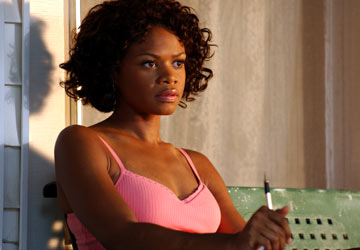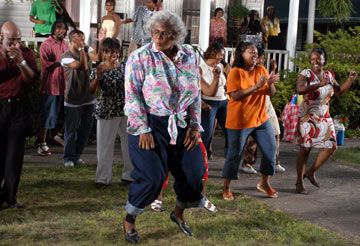

First, Woman, Thou Art Loosed. Now, Diary of a Mad Black Woman. Is this the birth of a new genre? Both these movies have deep Christian roots, and seek to portray African Americans as family loving, ordinary people. They do not want to glorify the stereotypes so prevalent in films today. It's similar to those 'buppie' films that come out every once in a while, except now, the characters are more middle class, more ordinary and relatable. Both films have starred the wonderful Kimberly Elise (Woman Thou Art Loosed, The Manchurian Candidate) and were written by Tyler Perry (who helped with the adaptation of Woman Thou Art Loosed). Who is Perry? That's a question most non-black people do not know the answer to. Perry is an extremely popular playwright, and Diary of a Mad Black Woman is based on one of his plays.
It's a shame that the film isn't better. Perry frequently panders to his audience, opting for cheap laughs instead of trying to make the story work. This comes primarily in the form of Madea, a character from some of Perry's other plays. Madea is a sassy old black woman who straight talks pearls of wisdom and waves a gun around. She is also Perry in drag. Aside from the fact that she is a Perry character, there is no reason for him to appear in drag. It wasn't funny when Eddie Murphy or Martin Lawrence did it, and it's not funny here. Every time Madea appears, it brings the viewer out of the story and forces them to gawk at Perry, and takes them away from the main movie, which is a mix of a romance and revenge film. Perry also plays two other characters, one a lecherous old man (again in heavy makeup) and a lawyer.
The mad black woman in question is Helen (Elise), the kept wife of rich Atlanta lawyer Charles McCarter (Steve Harris, Bringing Down the House, Minority Report). On their eighteenth anniversary (uh, if she was married at eighteen, that makes her thirty-six...whatever), he literally and figuratively throws her out of his enormous mansion in favor of another woman. She returns to Madea's, and is forced to start life over. Helen knew they had marital issues, but always wanted to work things out. Charles' actions devastate her. She had an easy life; now she needs to waitress, ride the bus, and figure out how to move on. She meets Orlando (Shemar Moore, The Brothers, Box Marley), the perfect man. They initially detested each other, which means they will eventually fall in love. Orlando is a nice, Christian man who works twelve hours a day and is unbelievably handsome.
Their love story is pretty nice. Both are trying to overcome recent hurts, and Perry does spend time with the characters, having them slowly open up to each other. However, Perry and director Darren Grant never favor subtlety. They hit viewers over the head with the emotions. That's why the courtship turns cornball at times ("I want to be your knight in shining armor") and Orlando is just too perfect. It's also why Charles gets his own over-the-top comeuppance. Because of things like this, Diary of Mad Black Woman is never able to find a tone and stick with it. This hurts the central story of Helen trying to become whole again. It's a shame for Elise, who can do so much better than films like this. Between Diary and Woman, she's taken more abuse that most actors should. Still, Perry knows what his audience wants, and as lame and cheesy at it can be at times, it's exactly what he gives them. As a result, Diary of a Mad Black Woman falls into the 'guilty pleasure' category. It's not a very good film, but it can be fun to watch.